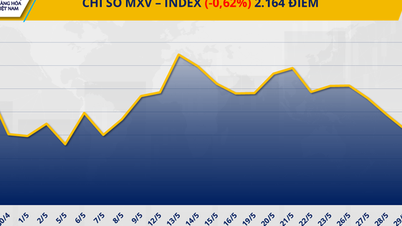
Resolution No. 68-NQ/TW of the Politburo on private economic development and Resolution No. 198/2025/QH15 of the National Assembly on “Some special policy mechanisms for private economic development” are not only “policy declarations”, but also the legal basis for promoting institutional and market corridors for private enterprises. However, realizing these orientations requires more commitments, specific, synchronous and drastic actions.
Add capital channel
An easily recognizable reality in the financial structure of Vietnamese enterprises is the dependence on bank loans. This is an inherent weakness, especially for small and medium enterprises - a group that accounts for 97% of operating enterprises.
Mr. Nguyen Quang Thuan, Chairman of the Board of Directors of the credit rating company FiinGroup, pointed out: “Enterprises are too dependent on the banking industry. In the stock market, real estate or funds..., institutional investors are still very weak. This is the key point to unlock long-term capital flows for the private sector”. According to Mr. Thuan, to diversify, there must be new financial products outside of banks. This dependence not only limits financial creativity, but also makes businesses vulnerable when the credit market tightens or interest rates increase.
The solution proposed by Mr. Thuan is to develop alternative financial products, such as corporate bonds, green credit and especially independent credit scoring systems. These are tools that have proven effective in developed markets, helping businesses access capital not only from banks but also from capital markets, institutional investors, and private equity funds. However, to do that, the legal environment must be one step ahead, transparent and have mechanisms to protect investors.
Regarding startups - the pioneers in innovation but also the most vulnerable group, Dr. Nguyen Dinh Thang - former Chairman of commercial banks, Vice Chairman of Vietnam Digital Communications Association, commented: "Nearly 100% of startup activities today come from the private sector, but lack clear support mechanisms, especially in terms of capital and collateral".
He believes that the State needs to get involved, not only with preferential policies, but also play the role of a "big customer", ordering products from domestic enterprises. Without this support, startups will find it difficult to compete with foreign "giants". At the same time, mastering basic technology is extremely important, and special policies are needed to encourage the development of core technology, especially "Make in Vietnam" products.
Not stopping there, lengthy legal procedures are creating barriers that slow down the flow of capital into production and investment. Mr. Dau Anh Tuan, Deputy General Secretary of the Vietnam Federation of Commerce and Industry (VCCI), described the current land use investment process as “very complicated, involving at least 15 major procedures and many minor procedures, involving many different fields, many authorities at all levels, lasting for many years, increasing risks to business plans”.
VCCI’s survey results show that 74% of businesses have to delay or cancel projects due to administrative procedures, especially land. In addition, 67% of businesses said that the processing time is longer than prescribed. This shows that without thorough institutional and administrative reform, all financial support efforts will be eliminated right from the source.
Need institutional boost
In the context of many legal reforms requiring time, the National Assembly has proactively issued Resolution No. 198 with immediate effect. Dr. Phan Duc Hieu, Standing Member of the National Assembly's Economic Committee, said: "This is a rare normative resolution passed just 10 days after Resolution 68, applied immediately to shorten policy lag."
The content of Resolution 198 is very practical, from interest rate support for green credit, clear regulations on the frequency of business inspections, to three-year tax exemption and free accounting software for small businesses. These policies, if effectively implemented, will help businesses feel more secure when expanding their operations.
However, as Mr. Hieu warned: "The resolution cannot succeed on its own, but must be implemented resolutely, early and strongly." This requires the real participation of the entire administrative apparatus, from the central to local levels.
Mr. Nguyen Ba Hung, Chief Economist of ADB Bank, frankly stated: "The difficulty for businesses is not high costs, but complicated procedures and unclear processing times."
Investment and production are activities that require medium and long-term planning. Therefore, the business environment must be stable and predictable. Mr. Hung suggested that management agencies should have a clear commitment to the time for processing administrative records, or default approval if the deadline is exceeded, as a simple but effective solution, helping to reduce uncertainty risks and increase transparency.
Dr. Tran Thi Hong Minh, Director of the Institute for Policy and Strategy Studies, added a practical perspective: “Reforms need to start with the most specific things, such as sharing data between business registration agencies and tax and social insurance agencies... to reduce time and money costs for businesses.” These are seemingly small reforms but have great significance, especially for startups or small-scale businesses.
Although support policies are being strongly promoted, businesses themselves need to innovate and adapt. Dr. Phan Duc Hieu said: "If they do not improve their own capacity, businesses will be eliminated when the market expands and competition increases."
Obviously, to create leverage for the private economy, it is necessary not only to open more capital channels and develop a healthy capital market, but also to clear legal bottlenecks, reform institutions and build a transparent policy environment. When policies are implemented consistently, administrative institutions are thoroughly reformed and businesses proactively innovate, capital will not only flow more strongly but also more sustainably.
Source: https://doanhnghiepvn.vn/doanh-nhan/tai-cau-truc-dong-von-cho-doanh-nghiep-tu-nhan/20250529082302977


![[Photo] Prime Minister Pham Minh Chinh attends the event "Digital transformation of the banking industry by 2025"](https://vphoto.vietnam.vn/thumb/1200x675/vietnam/resource/IMAGE/2025/5/29/0e34cc7261d74e26b7f87cadff763eae)























![[Photo] Prime Minister Pham Minh Chinh receives leaders of Excelerate Energy Group](https://vphoto.vietnam.vn/thumb/1200x675/vietnam/resource/IMAGE/2025/5/29/c1fbe073230443d0a5aae0bc264d07fe)





























































Comment (0)